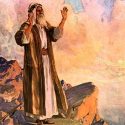
Parashat Haazinu: Are you listening?
The entire world, heaven and earth, is asked to listen to Moses’ final speech:
Give ear, O heavens, let me speak; Let the earth hear the words I utter! (Deut. 32:1)
This is his last chance to deliver reminders, motivation, and chastisement to the Israelites. Parashat Haazinu (Deuteronomy 32:1-52) is one of the shortest parshiyot in the Torah, but also one of the most remarkable. As you may recall, it is a poem (or song) recited by Moses, and it is written in the Torah in two narrow columns. The phrases are short and concise, and the images are evocative. Moses has spent the Book of Deuteronomy recounting the events that led us to the border of the Land of Israel, as well as reviewing all of God’s teachings and commandments. But this week’s text is the final declaration, the final opportunity for Moses to lead us. In nearly all congregations, Haazinu is the last Torah portion recited for the year (next week is Yom Kippur, then we have a special Torah portion for Sukkot, and then we are back at the start of Genesis).
Lest we dismiss the imagery of the first verse as merely poetic, Rashi sees a profound meaning behind the use of Heaven and Earth:
האזינו השמים HEAR YE HEAVENS that I warn Israel, and be ye witnesses to this matter; for so I have told them that ye will be witnesses (cf. Rashi on Deuteronomy 31:28). Similar is the meaning of ותשמע הארץ (i.e. the verb has the force of an imperative: AND LET THE EARTH HEAR). And why did God call heaven and earth as witnesses against them? Moses thought: “I am a being of flesh and blood (mortal); tomorrow I shall be dead. If the Israelites will once say, ‘We have never accepted the covenant’, who can come and refute them?” Therefore he called heaven and earth as witnesses against them — witnesses that endure forever (Sifrei Devarim 306:15). And a further reason was that if they should act worthily, the witnesses might come and give them their reward: the vine might yield its fruit, the ground give its increase, the heaven bestow its dew; while if they should act sinfully, the hand of the witnesses might first be against them.
We see that Heaven and Earth are witnesses to this speech. But who else is the intended audience?
Rabbi Paul Citrin reminds us that WE are the ones who should be listening. Moses is calling out to us from this text.
“Haazinu raises an urgent question: who is its audience? If we say it was addressed to the complaining, faithless Exodus generation, we overlook that nearly all of them were dead by the time of Moses’ recitation. If it is meant for those born in freedom in the wilderness, it sweeps broadly beyond their deeds and their experience. Nachmanides viewed Haazinu as more than a rebuke. It is to him a prophecy about Israel’s history from the time of entering Eretz Yisrael until the future redemption (see Y. Nachshoni, Studies in the Weekly Parashah: Devarim [Brooklyn: ArtScroll, 1989], p. 1,404).
A close reading of Haazinu suggests the audience is the entire Jewish people in every generation. It reminds us that the path to redemption — as a community that exemplifies a living Torah — is neither straight nor circular. The journey we make through history is a spiral. It is one of repeated errors and lapses of values, but also of moral progress, compassion, vision, and hope.”
We are standing here in the spiral of history, as well as the spiral of our own life’s journey. Tonight, we celebrate the New Year, and we begin the soul-searching and self-reflection that is required of us during these Days of Awe. I wish you all a sweet, good, and healthy new year, and I look forward to worshiping, learning, and turning with you in the coming days. L’shanah tovah u’metukah!





